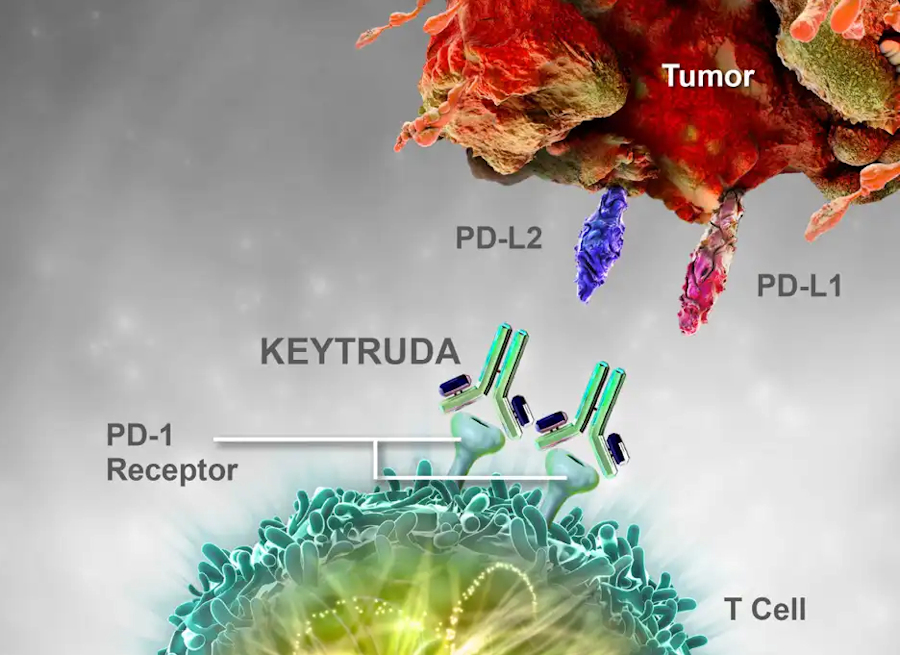For many cancer patients, Keytruda — a humanized antibody used in cancer immunotherapy to treat melanoma and other cancers — has been viewed as something of a “wonder drug” that works by blocking the progression of cancer and providing cancer patients with many extra years of life.
 “Keytruda, Merck’s brand name for pembrolizumab, is used to treat melanoma, non-small cell lung cancer, head and neck squamous cell cancer, Hodgkin’s lymphoma, esophageal cancer, stomach cancer, bladder cancer, kidney cancer, cervical cancer, endometrial cancer and certain types of breast cancer,” said Bradley Larson, MD, a board-certified fellowship-trained oncologist and hematologist with Northwest Georgia Oncology Centers in Carrollton, Georgia.
“Keytruda, Merck’s brand name for pembrolizumab, is used to treat melanoma, non-small cell lung cancer, head and neck squamous cell cancer, Hodgkin’s lymphoma, esophageal cancer, stomach cancer, bladder cancer, kidney cancer, cervical cancer, endometrial cancer and certain types of breast cancer,” said Bradley Larson, MD, a board-certified fellowship-trained oncologist and hematologist with Northwest Georgia Oncology Centers in Carrollton, Georgia.
According to Larson, Keytruda has also been approved for use on any solid tumor that is “mismatch repair gene deficient” — that is, when tumor suppressor genes are lost. This makes the tumor more susceptible to immune therapy by causing something called increased microsatellite instability.
While that all sounds very technical and scientific — which it is — Dr. Larson breaks it down in a way that’s a bit easier to understand.
How is it administered?
Keytruda is given to patients once every three weeks in a dosage of 200 mg with an IV. However, due to its long half-life of 25 days, the antibody therapy has also been approved in a dosage of 400 mg once every six weeks.

How does it work?
“Cancer cells have developed the ability to push on the brakes of the immune system — our lymphocytes — and get them to go away,” said Larson. “The antibodies in Keytruda block the PD-1 receptor that allows that to happen. It’s almost like putting a brick under the brakes of the immune system, allowing our body’s own immune system to destroy the cancer cells.”
Who benefits most?
According to Dr. Larson, Keytruda is primarily given to cancer patients with metastatic disease, which means that cancer has spread to other parts of the body. Often their cancer cannot be treated with surgery or radiation, and/or other cancer treatments did not work or have stopped working.
“We have some patients who will have a complete response and they will maintain for years on end, ranging to some patients for whom it will not work,” said Larson. “Melanoma is more responsive to immune therapy than some other cancers.”
Are there any side effects?
Larson explained that Keytruda is very well tolerated in around 90% of patients. However, around 10% of patients will experience autoimmune side effects – which means that the body’s immune system will attack just about any organ in the body. The most common are the thyroid gland and the adrenal gland.
“We’ve seen it cause pneumonitis in the lungs or colitis in the colon, for example,” said Larson. “When it does that, we have to treat it with steroids and sometimes other agents to calm it down. Patients still tend to have a really good response to Keytruda.”
Results matter
Despite the possibility of Keytruda causing autoimmune responses, or sadly, of it not working for all patients, Dr. Larson highly recommends it.
“There is nothing else like Keytruda in the history of oncology. It has gotten more approvals for a single drug than anything that has come before it,” said Larson. “It is truly amazing how rapidly Merck has studied Keytruda in so many types of cancers. They’ve done a lot of studies all at the same time. They really spent a lot of time and effort to do that. It’s what President Carter got when he was diagnosed with metastatic melanoma. He is still disease free.”
Northwest Georgia Oncology Centers, with offices in Carrollton, Villa Rica and Bremen, has treated hundreds of area patients with Keytruda since it was first approved for use in 2014. The immunotherapy continues to produce great results for many patients every year.
Learn more about Keytruda. Learn more about Northwest Georgia Oncology Centers.